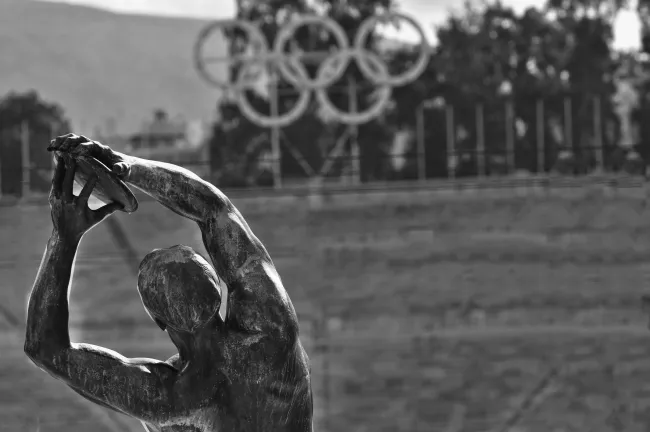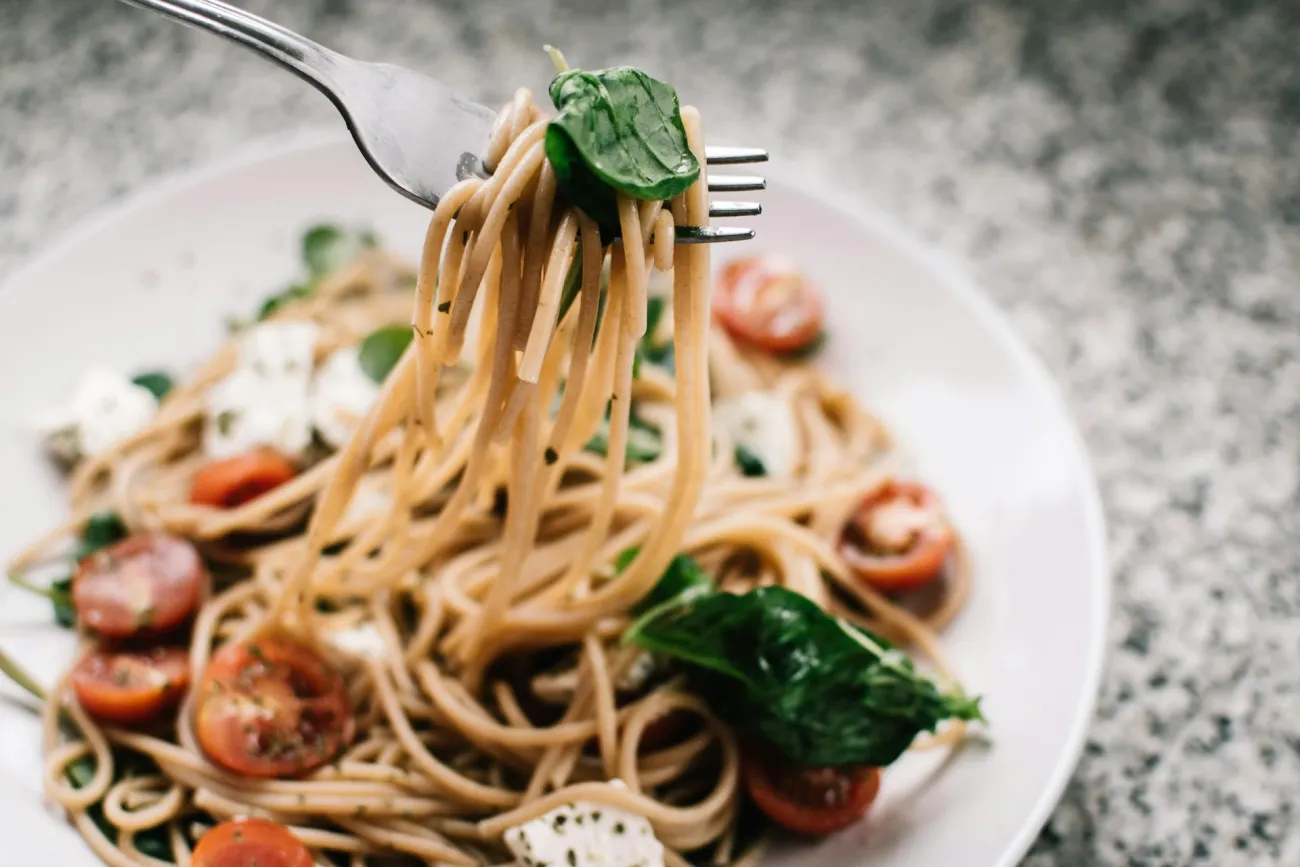13 million meals served. Zero chicken nuggets. 60% vegetarian. All fruit and vegetables, dairy, meat, eggs and cereals are sourced from France – pears from Nantes, lentils from Lyon, and Tomme cheese from Bordeaux. They’re even turning 40 tonnes of used coffee into fertiliser.
At the Paris Olympic Games, France is keen to show off its culinary prestige to the 15,000 athletes, 20,000 journalists and millions of spectators. But this time, it’s with a green twist.

13 million meals served. Zero chicken nuggets. 60% vegetarian. All fruit and vegetables, dairy, meat, eggs and cereals are sourced from France – pears from Nantes, lentils from Lyon, and Tomme cheese from Bordeaux. They’re even turning 40 tonnes of used coffee into fertiliser.
At the Paris Olympic Games, France is keen to show off its culinary prestige to the 15,000 athletes, 20,000 journalists and millions of spectators. But this time, it’s with a green twist.
For this edition of Fodder, we’ve delved into the 40-page food strategy for Paris 2024 to bring you their vision of food sustainability, the methods and evidence that have shaped their decisions, plus some of the tensions and politics. We’ve talked to food service professionals about the process of managing the complex trade-offs and logistics at events, and ask what the legacy could be of a global event that brings food sustainability to the fore. Could it put France on the map as a food pioneer, or might it suffer from an almighty public backlash?
Highlights of the Paris 2024 Food Vision
- A carbon budget of 1kg per meal, claiming to represent half those of the previous games and of the national French average.
- 60% of all the meals offered to spectators are vegetarian and the amount of meat in meals will be reduced, with a focus on high quality and underutilised parts of meat.
- 100% of food waste will be recovered.
- All fruit, vegetables, cereals, beef and dairy products are sourced from France.
- 80% of ingredients will come with a sustainability certification and 30% from organic farms.
- Single-use plastic will be cut by half compared to previous games.
- But foie gras will be served in the VIP tent despite a letter sent by academics and activists voicing their concern over animal ethics.
The evidence, the methods and the tensions
Unlike previous games where carbon was assessed after the event, Paris has developed a model to predict and calculate emissions for every aspect of the Games – shifting from estimating the damage towards pre-planning and transparency. The target of 1kg per meal – half of previous Olympics – flowed from the overall target of halving the carbon emissions of the whole games.
The most effective way of keeping within the budget of 1kg of carbon per meal, notes the policy, is by reducing the amount of meat and increasing plant-based foods within the meals. For spectators, volunteers and the media, this means simply increasing the amount of vegetarian options and reducing the amount of meat in dishes, in line with research literature on healthy and sustainable diets that recommend a diet rich in fruit, veg, cereals, pulses and nuts, and low in animal products. How much meat, dairy, eggs and animal products we should eat is a contentious debate in the future of food systems, one that we explore in our explainer Meat, metrics, mindset.
Obviously, this is not what springs to mind when we think of French cuisine. Normally, we might think of wheels of creamy cheese, or thick cuts of steak with lashings of buttery sauces, rich charcuteries and duck confit.
But isn’t that exactly the point? Paris 2024 wants to show that French cuisine can keep up with the times and be not only delicious, but healthy and sustainable. It builds on the concept of gastro-diplomacy that Sam Chapple-Sokol defines as the use of food “to capture and retain the heart of the global public, which has the potential to exert soft power over them.” The French are masters of this, but at the Olympics the nation is attempting to recalibrate its brand. You could call it eco-gastro diplomacy.
Instead of côte de bœuf and potato dauphinoise, chefs have designed dishes such as quinoa risotto with smoked and fermented yoghurt, using locally sourced and seasonal ingredients.
However, there are always exceptions, and foie gras from forced-fed ducks and geese has sneaked onto the VIPs’ menu despite the protests of groups like Animal Equality. Of course, some would argue that environmental sustainability and ethical concerns about the treatment of animals should not be conflated. This is a discussion that will run and run.
It’s not just about the emissions
Considering the Olympic Games is essentially a global marketing moment for all things French, including French cuisine, it’s not surprising that the Paris 2024 Food Vision has a strong undercurrent of localism. In the design of the strategy, the organisers held a consultation with 120 organisations who collectively represented the entire food value chain. Two priorities were identified: “Using the games to spotlight the variety and quality of French products and savoir-faire” and “supporting and celebrating all sectors of French agriculture by maximising local and quality supply.”
This is reflected in the policy - 80% of the food will come from France and 25% from within 250 km of Paris. The question is, does this approach make for greater sustainability? Some would argue that although local provenance is important for the French economy, it’s a flawed and oversimplified proxy for overall sustainability. Yes, you reduce the transport, but this is generally a small proportion of overall emissions while land-use and on-farm emissions account for more than 80% of most foods. Others would point out that sustainability is a broader, more all encompassing concept and that greenhouse gas emissions are just one consideration of many, many factors relevant to sustainability at the Olympics, and more broadly. We explore these tensions of local food debates fully in our explainer on food sovereignty.
The Paris 2024 Food Vision does in fact do a good job of addressing this tension head on with its commitment to sustainability certification, says managing director of The Sustainable Restaurant Association, Juliane Caillouette Noble. 80% of ingredients will have a sustainability label, and 30% will come from organic farms.
“If you simply focus on local food without having a commitment to farming [practices] – there is no assurance that you are actually doing anything to reduce GHG impact,” says Caillouette Noble.
The fact that 80% requires both local and a sustainability certification, especially organic, offers a good counterbalance she explains.
Instead, Caillouette Noble sees the main tension as their commitment to halving plastic waste while continuing to be sponsored by Coca Cola, the world’s largest plastic producer.
“The biggest irony of all is that [suppliers and spectators] are being asked to eliminate single use plastic, while Coca-Cola products are still being sold in plastic packaging,” she says.
Likewise, author of Ultra-Processed People, Dr Chris Van Tulleken argues in an article in the UK tabloid newspaper, Daily Mail that Coca-Cola should be banned from the Olympics, describing fizzy drinks as the new tobacco for young people.
The legacy
Caillouette Noble believes that the Paris plan for food sets a new bar for sustainable catering, building on the shoulders of London 2012 – the first with a food strategy - and of COP26 in Glasgow, that displayed the carbon emissions of each meal.
But, the Games’ green agenda has drawn criticism from athletes who have complained of shortages of eggs and chicken meat in the Olympic Village.
Athletes at this Olympics are not subject to the same criteria as spectators are and can in theory, eat as much animal product as they like, given their very exacting nutritional requirements. However, the Food Vision had planned to nudge athletes towards eating more plant-based food, by increasing the availability of and highlighting vegetarian food at the Village. It’s unclear if there is a link between their sustainability policy and the shortages, but the catering team have had to order in 700 kg of extra eggs and a tonne of meat to meet the shortfall.
The shortages have been jumped on by the president of the EU’s most powerful farming lobby, Copa Cogeca, Christiane Lambert, who said on social media platform X that: “The organisers have underestimated the need and desire of food high in protein that only animal protein can provide to recover from performances and training.”
Meat politics, localism, plastic problems and the value of certification. In other words, food at the Olympics is a microcosm of the debates happening in wider society.
Written by Jack Thompson, communications and research officer for TABLE. Alongside his work at TABLE, he works as a food systems journalist and has written for the Financial Times, Al Jazeera and AP. You can read the commentary online and send us feedback at jackthompson@tabledebates.org




Comments (0)